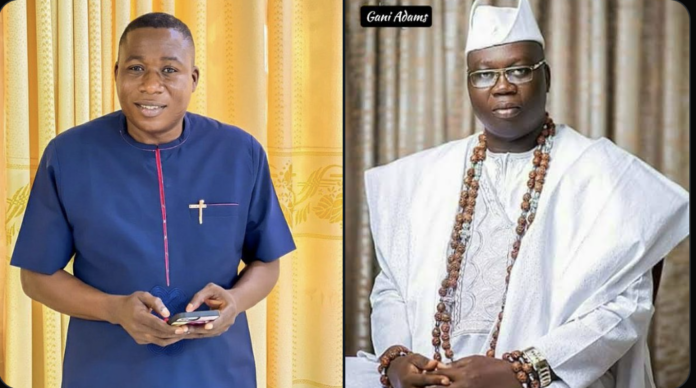Gani Adams, the Aare Ona Kakanfo of Yorubaland, has taken Yoruba Nation activist Sunday Adeyemo, widely known as Igboho, to court in a high-stakes lawsuit.
In a move that has stunned many, Adams claims Igboho violated his fundamental rights by recording and releasing a private phone conversation without consent.
Adams filed the suit at the Oyo State High Court in Ibadan, seeking a declaration of his right to privacy under the Nigerian Constitution.
The legal action centers on Adams’ claim that Igboho made an unauthorized recording of a conversation between Adams and a third party, Nurudeen Banjo, who resides in the United States.
Adams argues that this recording, later shared publicly on social media, inflicted serious harm on his dignity and role as the Aare Ona Kakanfo, an esteemed Yoruba title.
In the court filing, Adams stated that Igboho’s actions violated Section 37 of Nigeria’s 1999 Constitution, which protects the privacy of citizens’ communications.
“Everyone in Nigeria, including myself, has the right to private telephone conversations,” Adams’ court filing read.
He added that Igboho’s alleged behavior was “unlawful, illegal, and unconstitutional,” and he is seeking N5 billion in damages for the severe harm done to his reputation.
Adams expressed distress over the public broadcast of his private call, which he says was done without his knowledge or consent.
According to Adams, the leak of the conversation has led to numerous attacks against him on social media, with accusations that he insulted and disparaged Igboho.
In his affidavit, Adams stated that Igboho has been making “vicious” statements about him on both traditional media and social media platforms since April.
These statements, Adams argues, paint him as an enemy of Igboho and are intended to undermine his role as a Yoruba leader.
“Since this recording became public, I have been attacked on social media as a political thug, mercenary, murderer, and fraudster,” Adams said in his court statement.
He added that the public broadcast of his private conversation has caused him “serious embarrassment” and has been damaging to his role as the Aare Ona Kakanfo of Yorubaland.
Adams claims this breach of privacy should not go unpunished and insists that public exposure of private conversations without consent must be condemned.
“Bringing private telephone conversations into the public domain without court orders or consent is an invasion of my privacy,” Adams said.
In the suit, Adams called for the court to confirm his rights to privacy as guaranteed by Section 37 of the Constitution.
He also demanded an order declaring it “unlawful” for Igboho or anyone else to secretly record or publish private conversations.
Adams’ lawyers have argued that the case goes beyond just personal grievances, claiming it is about upholding the rights of Nigerians to private communications.
In their submission, they stressed that this lawsuit could set a precedent for protecting citizens from similar privacy invasions in the future.
According to Adams, any invasion of privacy, particularly through unauthorized recording and distribution, should be strongly condemned.
As the legal battle continues, Adams has urged the court to recognize his right to compensation for the harm and distress he claims to have suffered.
Public opinion has been split, with some Nigerians supporting Adams’ decision to file the lawsuit, while others are questioning if it is appropriate given the close ties between Adams and Igboho.
Many supporters of Igboho, who see him as a champion for Yoruba rights, have expressed skepticism about Adams’ intentions, calling the suit a tactic to weaken Igboho’s standing.
However, Adams maintains that his decision to go to court is based on principle, stating that “no one is above the law.”
He insists that everyone, regardless of social status, must respect each other’s rights, especially when it comes to privacy.

